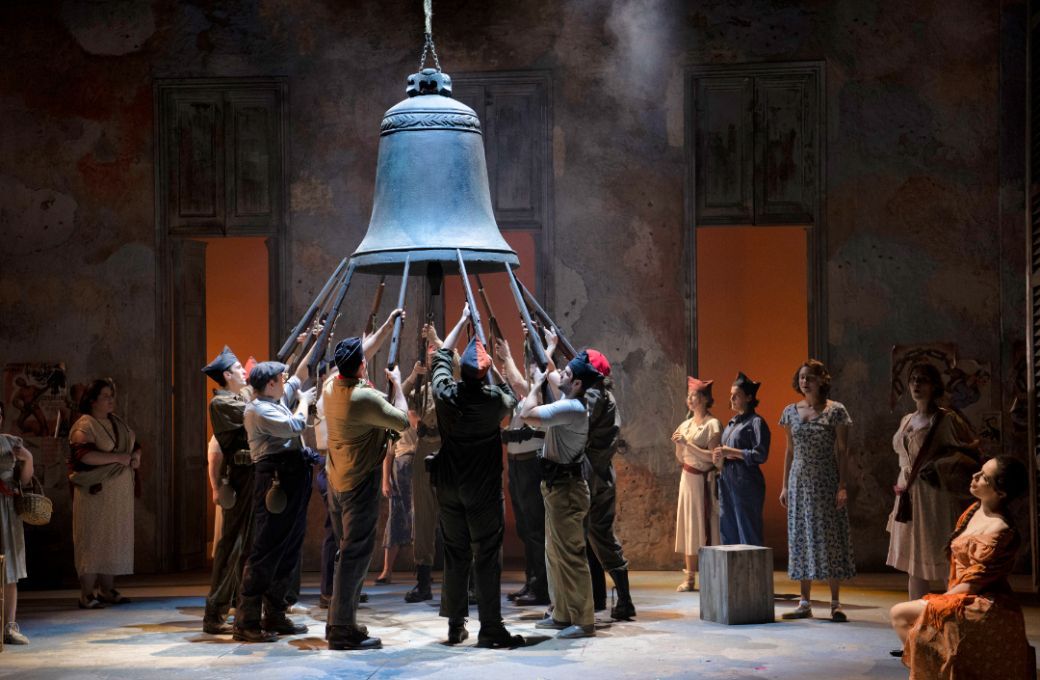“Send not to know…” reads the curiously elliptical reference to John Donne’s famous lines projected onto the curtain as it rises on the 74th Wexford Opera Festival. Contrary to this opening salvo, Wexford specialises in curiosities and opens this year with Verdi’s Le Trouvère, the 1857 French edition of Il trovatore, reworked for the Paris Opera.

Originally set during a civil conflict in medieval Spain, the story, under the direction of Ben Barnes, finds itself updated to the Spanish Civil War. The rest of the lines about asking not for whom the bell tolls etc appear as the timpani roll, revealing that the spirit of Hemingway has hitched a ride for opera’s most circuitous descent of man.
Two brothers, separated in infancy, find themselves unwittingly fighting on opposing sides and in love with the same woman. Princess Leonore is a sucker for a communist on a bicycle – Manrique, the opera’s titular troubadour – much to the annoyance of Manrique’s Fascist brother, the Comte de Luna. The inevitable trouble ensues and Leonore wisely enters a convent. The cause of the brothers’ unfortunate separation? A desperate act of revenge, the details of which drama in any form would struggle to contain, and in order for Verdi’s opera to do so we must believe that a gypsy woman who, as a girl, watched her own mother burn at the stake, could abduct the perpetrator’s son, throw her own on the fire by mistake, and lovingly bring up the hostage as her first-born. A tale spun from centuries of dehumanising narratives about the Roma, there’s a story to be told here that doesn’t reduce generational trauma to a plot point without investigating its causes, but with so many of Verdi’s irresistible tunes to accommodate in the course of the evening, it would be a brave director who didn’t just keep things simple.
But there’s simple and there’s simplistic, and unfortunately this production – by asking too little – finds itself too often in the wrong camp. There’s a lot of singing to get through, and much of it is excellent, but there’s a sense that characters find themselves in situations not of their own making, stand, sit or lie there and sing about them. Apart from some clunky scene changes and fussing with props, there is little on stage in terms of action that really drives or interrogates the story. A dramaturgical opportunity offered itself with the inclusion of the ballet sequence Verdi was required to put in for Paris, but Barnes chooses instead to show, at length, documentary footage of the gallant comrades, have the dancers illustrate it, then turn their backs watch along with us. The music is wonderful, of course, and as the Wexford auditorium provides the nearest acoustic opportunity to actually being in the pit (bar the thumps and bumps from above) this awkward longueur was at least a chance to enjoy Marcus Bosch’s attention to detail and savour the score on its own terms.
There are benefits to being left by one’s director to get on with it, and Lydia Grindatto’s Leonore was definitely one of them. Making her Wexford debut, the Grand Finals Winner of last year’s Laffonte Prize combined compelling vocal power with an intimate and convincing dramatic presence. Despite her ill-health being advertised at the top of the show, Grindatto’s sensitive relationship with the orchestra, especially in Brise d’amour, was the star of this production. Eduardo Niave, also new to Wexford, was suitably hot-blooded as Manrique, and managed the best any over-excited enemy of the state could with the highest and longest notes in this demanding endurance-tenor role.
Giorgi Lomiseli was a brooding presence as the fraternal nemesis, though without the dashing paraphernalia of the Brigades he cut a frustrated figure. A uniform and a map are no match for rifle-toting communists colourfully saluting a giant bell of freedom during the Anvil Chorus. A force to be reckoned with, Ksenia Nikovaeiva demonstrated impressive power and range, really capitalising on Verdi’s dramatic writing for Azucena though she will need to wrestle with her French diction before she can fully conquer this role.
A surprise appearance of the men’s chorus singing “Let the warlike trumpet sound” from within the auditorium provided a welcome change in pace and register: one of many instances in this production of high quality ensemble singing.
Liam Doona’s pockmarked realist design achieves an important gear change at the last minute, finding a dynamic expressionism as church and state collude, but quite how much we really know of what there is to know, beyond that Verdi still retains the power to open a festival, is not certain.
Eleanor's press trip was funded by Wexford Festival Opera


